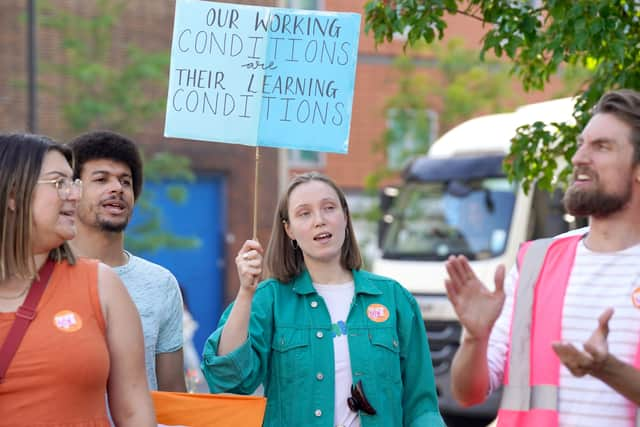Teacher strikes: schools face major disruption as NEU members walk out for second time this week over pay
and live on Freeview channel 276
Teachers across England are holding fresh strikes on Friday (7 July) as ministers are warned unrest could escalate into the autumn term unless there is action on salaries.
The Department for Education (DfE) said the action would cause disruption to pupils and parents and result in the cancellation of children’s end-of-term events.
Advertisement
Hide AdAdvertisement
Hide AdIt follows walkouts on Wednesday (5 July) by members of the National Education Union (NEU) which resulted in several schools being either fully closed or restricted access to certain groups of pupils.
The latest industrial action marks the seventh national strike schools have faced by members of the NEU since February.
Union members went on strike across England on 1 February, 15 and 16 March, 27 April and 2 May, and regional walkouts took place between 28 February and 2 March. During the most recent strikes on 2 May, Department for Education (DfE) data suggests that 50% of state schools in England were open but restricting attendance, while 5% were fully closed.
NEU joint general secretary Kevin Courtney said: “No teacher wants to be taking strike action and this week’s strike action should not have been necessary.
Advertisement
Hide AdAdvertisement
Hide Ad“The responsibility for it lies at the door of the Prime Minister and the Education Secretary who continue to refuse to re-enter negotiations with education unions to reach a settlement on a fully funded pay increase for teachers.”


The government offered teachers a £1,000 one-off payment for the current school year (2022/23) and an average 4.5% rise for staff next year after intensive talks with the education unions.
But all four education unions involved in the dispute rejected the offer, and the decision on teachers’ pay in England for next year has been passed to the independent School Teachers’ Review Body (STRB).
The NEU has accused the government of sitting on that pay review body’s report which it believes recommends a 6.5% increase.
Advertisement
Hide AdAdvertisement
Hide AdMr Courtney said that if the pay dispute is “left unaddressed this action will only escalate in the autumn” as “four education unions are now balloting for action in the September term” which “should speak volumes to government.”
He added: “It is high time that the Prime Minister recognised that if he wants to have an education system that delivers the very best for the children and young people of this country his government needs to start listening and start negotiations.”
The deputy general secretary of the National Education Union (NEU), Niamh Sweeney, said it will be a “real failure” for the government if all four teaching unions vote to strike together.
Speaking at a picket line outside Oasis Academy South Bank in London, Ms Sweeney said: “The government needs to think – does it want to come round the table and negotiate now, or does it want the prospect of all four education unions being able to take strike action in September? That would be a real failure on their behalf.”
Advertisement
Hide AdAdvertisement
Hide AdThe DfE insisted a “fair and reasonable” pay offer had been made to the unions and “hugely” values the work of teachers.
On pay, a DfE spokesman said: “As part of the normal process, the independent School Teachers’ Review Body has submitted its recommendations to government on teacher pay for 2023/24.
“We will be considering the recommendations and will publish our response in the usual way.”
Comment Guidelines
National World encourages reader discussion on our stories. User feedback, insights and back-and-forth exchanges add a rich layer of context to reporting. Please review our Community Guidelines before commenting.
